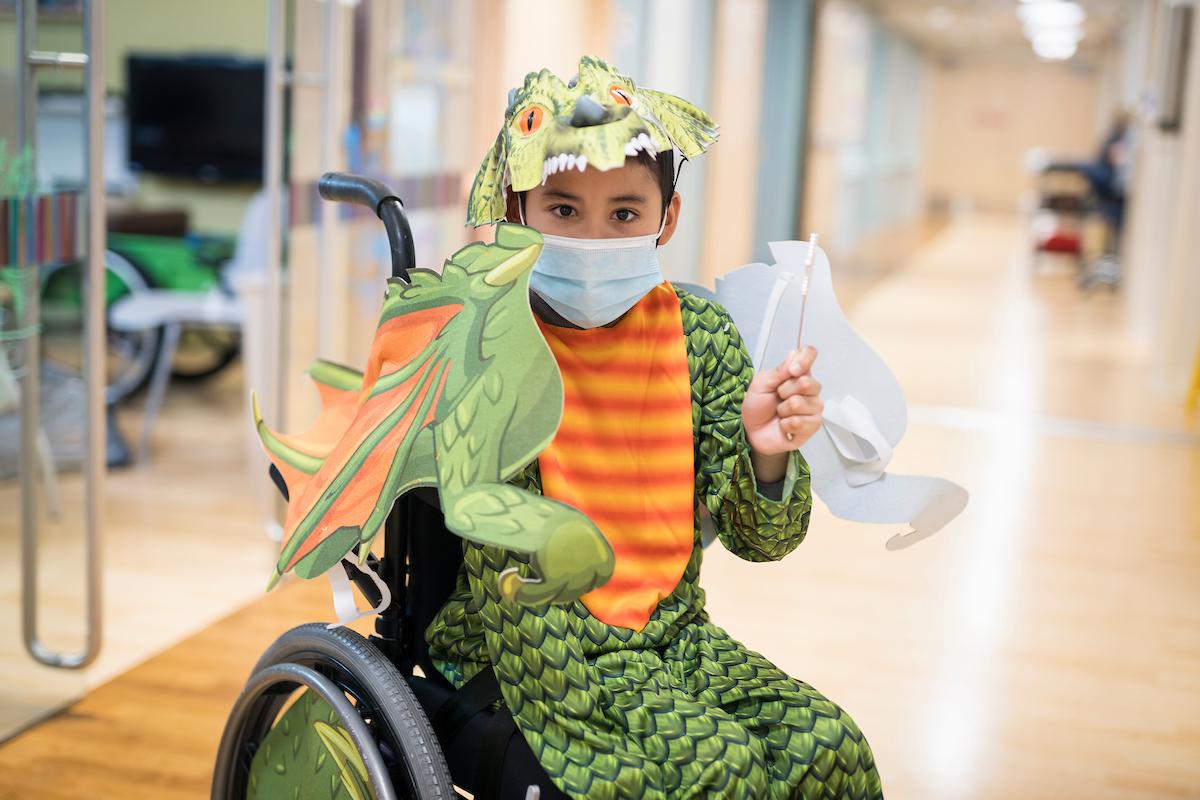Kids Like Tyler: Why Muscular Dystrophy Designation Matters
Parent Project Muscular Dystrophy (PPMD) recently named Gillette Children’s Specialty Healthcare a Certified Duchenne Care Center. The designation, held by only 16 clinics in the U.S., recognizes knowledge and leadership in the treatment of Duchenne muscular dystrophy, a degenerative neuromuscular condition that affects boys. For the Ash family of Prior Lake, Minnesota, knowing Gillette is PPMD-certified means reassurance, support and hope for their son, 5-year-old Tyler. Tyler’s mom, Marilyn Ash, describes him as a happy-go-lucky child with the rambunctious streak typical of kids his age. As she watches Tyler happily playing with Lightning McQueen and his other “Cars” toys, she describes how he came to be diagnosed with Duchenne muscular dystrophy. “I’m a genetic carrier and my older brother had Duchenne muscular dystrophy,” says Marilyn. She calls her brother, who passed away in 2005 at age 35, her best friend. Duchenne muscular dystrophy occurs when a gene on the X chromosome mutates, leading to lack of the muscle-protecting protein dystrophin. Without dystrophin, muscles progressively weaken. In the early stages of the condition this causes problems with movement, but as boys age, the important muscles of the heart and lungs are affected as well. Current life expectancy for boys who have the condition is 20-30 years. Tyler’s Duchenne muscular dystrophy occurs because of a duplication of exon 2 on the dystrophin gene. Females who carry the gene have a 50 percent chance of passing the condition to their male children, but approximately 35 percent of cases occur due to spontaneous mutation. This means that it can affect boys with a negative family history. It’s a lot to wrap your head around. “We went to genetic counseling but they weren’t familiar with Duchenne muscular dystrophy. As a result, we received misinformation about what the actual chances were,” Marilyn explains. “From the beginning I was suspicious of everything with Tyler,” Marilyn shares. “I kept watching his movements. He was a late walker and his speech was delayed, both telltale signs.” During Tyler’s early years, Marilyn and her husband, Chris Ash, met with frustration when doctors couldn’t confirm Tyler had the condition. “At every doctor’s appointment I would ask, ‘Do you think he has it?’ And everyone said no, that they would see signs,” remembers Marilyn. But Marilyn’s suspicions remained and she enrolled Tyler in speech therapy through the Prior Lake-Savage Area Schools. When Tyler was 3, a physical therapist with the school district noticed weakness in Tyler’s core and observed that he climbed stairs differently than most kids. It was the first time a medical professional echoed Marilyn’s concerns. “These were things I had already recognized so I said please—send me an email.” That email led the family to a creatine kinase (CK) blood test that would confirm Tyler’s diagnosis of Duchenne muscular dystrophy. “Creatine kinase is the enzyme that’s released by muscles, and an elevated CK level indicates abnormal muscle breakdown,” Marilyn explains. Without dystrophin to protect the muscles, CK levels skyrocket, indicating muscle damage that the body can’t repair. “Tyler’s CK level was 35,000 compared to a typical level between zero and 200. When we got that phone call we were completely devastated,” says Marilyn. Marilyn describes the thought of reliving the difficulty of her brother’s diagnosis with Tyler as beyond painful. “With my brother, I watched the disease take over. He went from walking to being in a manual wheelchair to being permanently in a power wheelchair.” The morning after Tyler’s diagnosis, Marilyn took action. She discovered PPMD in a Google search and made a phone call. The phone call led to Ryan Fisher, senior vice president of community engagement at PPMD, and something else. “He gave me so much hope. He told me, ‘I’ll hold your hand. I’ll help guide you through,’” says Marilyn. “That day I got our game plan going.” That game plan included connecting with the Duchenne muscular dystrophy community on Facebook—and, through that group, learning about developing gene therapy research studies Tyler could participate in. The family says they’re hopeful Tyler could enroll in a trial as early as next year. Tyler also became a regular patient at Gillette, where he sees an integrated team of neuromuscular specialists that includes pediatric neurologist Steve Smith, MD, pulmonologist Christina Mikesell, DO, cardiologist Ann Dunnigan, MD, and pediatric rehabilitation medicine specialist Supreet Deshpande, MD. They work closely with Tyler’s family to reduce the complications and slow the effects of his condition. “Knowing that Gillette is a PPMD-certified Duchenne Care Center means the world to us because we know for certain Tyler’s getting the specialized care that he needs. Dr. Smith is an awesome resource when something comes up because he has the experience; he can guide us,” adds Marilyn. PPMD selected Gillette as Minnesota’s Duchenne Care Center because of its comprehensive program that includes pediatrics, transitional care and adult care for individuals who have Duchenne muscular dystrophy. Families like the Ashes consider the certification to be an indication that a facility offers the best-of-the-best in terms of care and support for children who have Duchenne muscular dystrophy and the opportunity to participate in research trials.

An Inherited Gene
The Road to Diagnosis

A ‘Game Plan’ to Tackle Duchenne

In the Right Hands
Opportunity and Hope



Marilyn points to new treatments and therapies, in addition to research developments, as reasons to be hopeful. “We didn’t know about physical therapy or steroids when my brother was alive. These boys have opportunities now that they didn’t have before. Some of these interventions can help change the course of the disease’s progression, but they have to happen early.” Tyler, for example, attends physical, pool and speech therapy. He stretches every night, wears leg braces, and takes a daily steroid to help preserve his muscle strength.
“Duchenne is a really big disease that affects a lot. There are so many things you have to watch out for,” says Marilyn. “Coming to Gillette and knowing everybody’s familiar with Tyler’s condition makes it so much easier.”
“PPMD is wonderful with putting out information for families like ours,” concludes Marilyn. We try to keep it together and keep moving forward.”
Editor’s note: Read more about PPMD’s recognition of Gillette as a Certified Duchenne Care Center. For more information about Duchenne muscular dystrophy services and research, email Ryan Fisher with PPMD. You can also visit Tyler’s CaringBridge page to follow his journey.

Gillette leadership and physicians gather with the Ash family to celebrate the hospital’s designation as a Duchenne Care Center. From left: Steve Koop, MD, medical director; Paula Montgomery, general counsel; Barbara Joers, president and CEO; Marilyn and Tyler Ash; Randal Richardson, MD; Stephen Smith, MD; Lauryn Ash; Kit Brady, vice president of human resources, education and guest experience.




